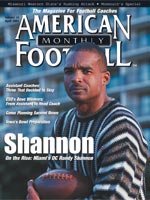AMERICAN FOOTBALL MONTHLY THE #1 RESOURCE FOR FOOTBALL COACHES
Article CategoriesAFM Magazine
|
If at First You Don\'t SucceedAfter watching his Hawkeyes lose 38-17 to USC in the 2003 Orange Bowl, Kirk Ferentz looked to the coaches of these teams that DID have bowl game successby: Steve Silverman © More from this issue One nasty defeat gnawed away at Kirk Ferentz’s gut for a full year. When Iowa rolled through the Big Ten schedule in 2002 and won eight straight games without a loss, it was one of the top stories in college football. Ferentz, then in his fourth season as head coach of the Hawkeyes, figured his team would be competitive in the Big Ten, but critics saw them as a middle of the pack team. With mobile Brad Banks at quarterback and Fred Russell getting the job done at running back, the Hawkeyes had one of the most versatile attacks in the country and also brought a hard-hitting and ferocious defense as well. The Hawkeyes exceeded all expectations. Ferentz thought his team was well-prepared and ready for battle when the Hawkeyes went to Miami to p....The full article can only be seen by subscribers. Subscribe today!
|
|
|||||||
| HOME |
MAGAZINE |
SUBSCRIBE | ONLINE COLUMNISTS | COACHING VIDEOS |
Copyright 2026, AmericanFootballMonthly.com
All Rights Reserved





